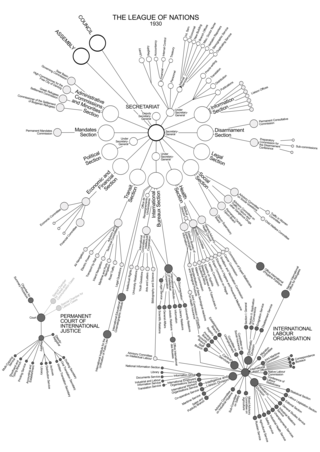
The Benelux Union or Benelux is a politico-economic union and formal international intergovernmental cooperation of three neighbouring states in western Europe: Belgium, the Netherlands, and Luxembourg. The name is a portmanteau formed from joining the first few letters of each country's name and was first used to name the customs agreement that initiated the union. It is now used more generally to refer to the geographic, economic, and cultural grouping of the three countries.

The International Astronomical Union is a non-governmental organisation with the objective of advancing astronomy in all aspects, including promoting astronomical research, outreach, education, and development through global cooperation. It was founded in 1919 and is based in Paris, France.

The president of the European Council is the person presiding over and driving forward the work of the European Council on the world stage. This institution comprises the college of heads of state or government of EU member states as well as the president of the European Commission, and provides political direction to the European Union (EU).

The Berlaymont is an office building in Brussels, Belgium, which houses the headquarters of the European Commission, the executive branch of the European Union (EU). The structure is located on the Robert Schuman Roundabout at 200, rue de la Loi/Wetstraat, in what is known as the "European Quarter". The unique form of the Berlaymont's architecture is used in the European Commission's official emblem. The building is named after the Convent of the Ladies of Berlaymont.

The Conference of European Churches (CEC) was founded in 1959 to promote reconciliation, dialogue and friendship between the churches of Europe at a time of growing Cold War political tensions and divisions.

The secretary-general of the European Commission is the senior civil servant of the European Commission. The secretary-general, who is responsible to the president of the European Commission, is in charge of the various Directorates-General, headed by directors-general.

The International Organization of Securities Commissions (IOSCO) is an association of organizations that regulate the world's securities and futures markets. Members are typically primary securities and/or futures regulators in a national jurisdiction or the main financial regulator from each country. Its mandate is to:

Brussels (Belgium) is considered the de facto capital of the European Union, having a long history of hosting a number of principal EU institutions within its European Quarter. The EU has no official capital but Brussels hosts the official seats of the European Commission, Council of the European Union, and European Council, as well as a seat of the European Parliament. In 2013, this presence generated about €250 million and 121,000 jobs. The main rationale for Brussels being chosen as "capital the European Union" was its halfway location between France and Germany, the two countries whose rivalry played a role in starting the two World Wars and whose reconciliation paved the way for European integration.

The General Secretariat of the Council of the European Union (GSC), also known as Council Secretariat, assists the Council of the European Union, the Presidency of the Council of the European Union, the European Council and the President of the European Council. The General Secretariat is headed by the Secretary-General of the Council of the European Union. The Secretariat is divided into seven directorates-general, each administered by a director-general.

In the European Commission, a cabinet is the personal office of a European Commissioner. The role of a cabinet is to give political guidance to its Commissioner. Members of a cabinet are equivalent, within UK Government nomenclature, to a special adviser or "SPAD". Technical policy preparation is handled by the European Civil Service. The term is not to be confused with the European Commission's top decision making-body known in EU-lexicon, as the "College of Commissioners".
Michel, Baron van den Abeele is a former Director-General of the European Commission, is actually chairman of the board of the Belgian public owned company APETRA and active in several Belgian charities.

The secretary-general of the Council of the European Union heads the General Secretariat of the Council of the European Union. In October 2022, the Council appointed Thérèse Blanchet as the Secretary-General of the Council for a five-year term, from 1 November 2022 to 31 October 2027.

The League of Nations was established with three main constitutional organs: the Assembly; the Council; the Permanent Secretariat. The two essential wings of the League were the Permanent Court of International Justice and the International Labour Organization.
The Commission of the Bishops' Conferences of the European Union, formerly the Commission of the Bishops' Conferences of the European Community, is the association of Catholic Church episcopal conferences in member states of the European Union (EU) which officially represents those episcopal conferences at EU institutions. COMECE holds two meetings of the Plenary Assembly each year, which set out the main lines of its work. The Apostolic Nuncio to the European Communities participates in these meetings. A seminal issue of the European integration process provides the core theme of each meeting.
The Parliament Magazine is a monthly EU politics, policy and culture magazine. Its website, www.theparliamentmagazine.eu, is a forum for discussion on the latest developments in EU politics and policy, featuring regular contributions from prominent European policymakers, the magazine's editorial team and freelance journalists.

The Juncker Commission was the European Commission in office from 1 November 2014 to 30 November 2019. Its president was Jean-Claude Juncker, who presided over 27 other commissioners. In July 2014, Juncker was officially elected to succeed José Manuel Barroso, who completed his second five-year term in that year.

The ninth European Parliament was elected during the 2019 elections and is slated to remain in session until the forthcoming 2024 elections.

Vincenzo "Enzo" Amendola is an Italian politician of the Democratic Party (PD). On 5 September 2019, Amendola was appointed Minister of European Affairs in the Conte II Cabinet.




















